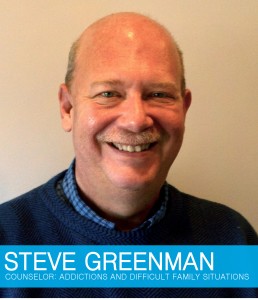By Steve Greenman, MA, LPC, NCC
“At the bottom of every person’s dependency, there is always pain, discovering the pain and healing it is an essential step in ending dependency.” Chris Prentiss, The Alcoholism and Addiction Cure
Do you have a love one struggling with emotional/physical pain using an unhealthy dependency (alcohol, pornography, gambling, drugs legal or illegal) to cope, escape or numb?
How helpless do you feel?
During my stay as a clinical therapist at a 28 day substance treatment center I had more than one client suggest the drugs/alcohol filled a void which nothing in the past ever had. One client shared to me his use of Heroin was best described as: “A hug from God”.
How do you combat a hug from God?
One has to remember you cannot save a person using a dependency, change can only come from the person themselves willing to make the effort. We can very easily if we are not careful become a part of the problem rather than the solution. It may be how we act out (anger, frustration, helplessness) which creates more division in the family than the person actually involved in the numbing/avoidance behavior.
Sherry Collier from her website – “Creative Path to Growth” in an article entitled “Compassion versus Co-dependency: Caring without Enabling” lists questions to ask yourself to determine if one is acting out of compassion or in a place of co-dependency:
- Ask yourself what is your motive? Am I trying to rescue someone else?
- Are we able to walk along side someone or do we need to have to fix the problem?
- Am I trying to “fix” someone else so as to not look at my own issues?
- Am I exhausted – physically and emotionally drained? Do I feel taken advantage of?
- Are you creating safe solid boundaries for yourself and the rest of the family?
This can be very difficult questions to ask when were dealing with a loved one but the soul inside the one combating dependency is not only struggling with the outside world but also within
AUTOBIOGRAPHY IN FIVE SHORT CHAPTERS
by Portia Nelson
I
I walk down the street.
There is a deep hole in the sidewalk
I fall in.
I am lost … I am helpless.
It isn’t my fault.
It takes me forever to find a way out.
II
I walk down the same street.
There is a deep hole in the sidewalk.
I pretend I don’t see it.
I fall in again.
I can’t believe I am in the same place
but, it isn’t my fault.
It still takes a long time to get out.
III
I walk down the same street.
There is a deep hole in the sidewalk.
I see it is there.
I still fall in … it’s a habit.
my eyes are open
I know where I am.
It is my fault.
I get out immediately.
IV
I walk down the same street.
There is a deep hole in the sidewalk.
I walk around it.
V
I walk down another street.
It may be time for not only our loved one but ourselves to find our way back home.
And so it goes
 Steve Greenman, MA, LPC, NCC is a counselor at Mental Wellness Counseling in Traverse City, MI. He specializes in helping families dealing with complex family situations, addictions, and transitions. Steve is also helping clients through the Intensive Recover Program, which helps with recovery treatment, alcohol treatment, and other addictions treatment.
Steve Greenman, MA, LPC, NCC is a counselor at Mental Wellness Counseling in Traverse City, MI. He specializes in helping families dealing with complex family situations, addictions, and transitions. Steve is also helping clients through the Intensive Recover Program, which helps with recovery treatment, alcohol treatment, and other addictions treatment.


